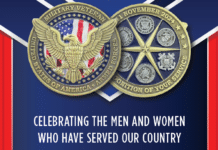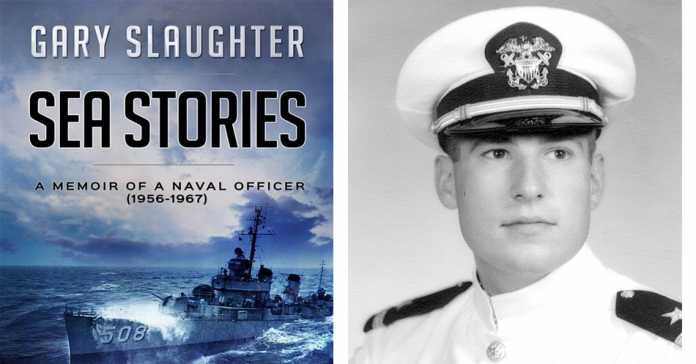by Gary Slaughter, Author of Sea Stories: A Memoir of a Naval Officer (1956-1967)
During the late summer of 1963, U.S.S. Cony (DDE 508) was assigned to assist in the Operational Readiness Inspections (ORI) of two nuclear ballistic missile submarines (SSBNs). The most significant aspect of the ORIs involved the actual firing of the submarines’ ballistic missiles from a position near the Azores Islands, down range to a monitoring station east of the Caribbean Islands.
To relieve the tedium of Navy life, softball games were organized for department teams. One morning, I donned my tropical whites, my Shore Patrol armband and badge and my obligatory sidearm, a Colt .45 automatic with holster mounted on a white web belt. My assistant wore the same uniform but was armed with a highly polished night stick stowed neatly in a sheath attached to his belt.
As the gunnery department sailors boarded the bus heading for a local park, spirits were high. Some ball-playing enthusiasts began singing “Take me out to the ball game . . .” in very loud voices. Punta Delgada residents just stared at us. But none of us seemed to care. Everyone was looking forward to the fun and nothing was going to spoil it for us.
We gathered together several picnic tables just off the first-base line. The fire was soon blazing, and the volunteer cooks began offering roasted hotdogs with all the trimmings and tall glasses of  frothy, ice-cold beer. My mouth was watering, but being on duty, I restrained myself.
frothy, ice-cold beer. My mouth was watering, but being on duty, I restrained myself.
The gunnery guys were really enjoying themselves, those on the ball field as well as their cheering squad on the sidelines. As the sun rose higher in the sky, the temperature soared and so did the level of beer and food consumption. Some of the huskier fellows had downed three beers and an equal number of hotdogs before the second inning came to a close.
The trash barrels next to the picnic tables were beginning to fill with partially eaten hotdogs and paper plates soaked through with pork and bean juice and spilt beer. Those were discarded with the other leftovers and a half-dozen charred hotdogs from the grill.
I was enjoying my first hotdog when one of the cooks came up beside me and pulled my sleeve. I turned his way to hear him over the noise of the crowd. He just pointed his thumb over his shoulder in the direction of the trash barrels.
I turned around and was stunned. There I saw four children reaching down into the trash barrels, retrieving discarded scraps of food, and stuffing them into their mouths. They were extremely thin, very dirty, and all dressed in tattered clothing. None wore shoes of any kind. It shocked me to see them pick up the soaked paper plates and suck them dry of pork, bean and beer juice.
Down the hill, I saw another shocking sight. At least 30 more children, dressed and dirty like those already at the barrels, were running toward their friends to join in the feast. By this time, the crowd of sailors standing along the first-base line turned around and walked slowly and incredulously toward the children at the barrels.
By the time the crowd from the hillside had arrived, all the sailors were circled around the barrels watching this heart-wrenching scene. Any sailor with food left on his plate handed it to a child who nodded appreciatively and ravenously choked down the gift. The cooks didn’t wait for permission to support the cause, they loaded the grill with all the remaining hotdogs and opened bag after bag of rolls. The sailors joined in, opening bottles of soft drinks and distributing them to the kids. The cooks reached under the picnic table and brought out our surprise dessert, a huge box of peanut-butter cookies. These were given to the children as well.
 The flow of children up the hill never stopped. By the time the food ran out, there were about 80 children enjoying our picnic. When the supply of food was exhausted, each child shook the hand of the nearest sailor, waved goodbye, and wandered back down the hill.
The flow of children up the hill never stopped. By the time the food ran out, there were about 80 children enjoying our picnic. When the supply of food was exhausted, each child shook the hand of the nearest sailor, waved goodbye, and wandered back down the hill.
We were speechless. None of us had ever seen anything like this before. Without saying a word, the sailors gathered up the ball equipment and cooking gear and stored it in the back of the bus. Then one by one, the sailors re-boarded the bus. Ray got in, started the bus, and we headed back to the ship. No one had said a word. Not as we unloaded the bus. Not as we walked up the gang plank. Not as we retreated to our compartments.
As a matter of fact, to my knowledge, none of us has ever spoken about this incident since it happened in 1963. Why? It was too painful to remember.
GARY SLAUGHTER is the author of the award-winning Cottonwood series. Slaughter served as a naval officer for seven years after graduating from the University of Michigan. After establishing a distinguished business career in corporate information technology, he decided to put his career on hold to write his first novel, Cottonwood Summer. Slaughter’s latest book, Sea Stories: A Memoir of a Naval Officer (1956-1967), brings to life 60 vignettes of his time as a Cold War naval officer. He and his wife, Joanne, live in Nashville, Tennessee. Learn more at www.garyslaughter.com.
All content herein is owned by author exclusively. Expressed opinions are NOT necessarily the views of VNR, authors, affiliates, advertisers, sponsors, partners, technicians, or VT Network. Some content may be satirical in nature.
All images within are full responsibility of the author and NOT VNR.
Read Full Policy Notice - Comment Policy



























